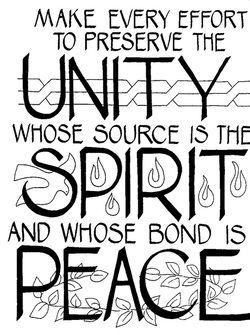 There has been much discussion through the years about Paul's "thorn in the flesh" mentioned in 2 Corinthians 12:7-10. Personally, I've decided that the problem was Jews following him around (see Acts 25:24), harassing him, making charges against him, and demanding his death much as Paul did to others before he became a follower of Jesus. What great irony that provides. Paul describes the thorn as "an angel of Satan, to beat me, to keep me from being too elated" over the revelations he had from God. Obviously then, the thorn in the flesh is not from God. Paul admits that he asked God three times to remove it. But God assured him that he was strong enough to handle it. So Paul accepts it and goes on to say, "I am content with weaknesses, insults, hardships, persecutions and constraints . . . ." We can imagine how Paul might respond, in weakness, to insults and persecutions, even heckling, while he is trying to preach. The types of things being said about him are listed by Paul in Acts 25: 7-8, when Paul is defending himself before Festus in Caesarea. "On Paul's arrival in court the Jews from Jerusalem gathered around, hurling many serious accusations which they couldn't prove. Paul denied the charges: 'I am not guilty,' he said. 'I have not opposed Jewish laws or desecrated the Temple or rebelled against the Roman government.'" These are three serious charges. And it is the harassment, heckling, false accusations and being followed from town-to-town that I think comprise Paul's thorn in the flesh. For Reflection: It may be that we find people hindering us in our work or our ministry. We may have one or more people whom we consider to be our thorn in the flesh. If so, have we asked God to remove them, as Paul did? If not, this may be the next option. But if we have done so, and God has not seen fit to remove them, have we found God's grace to be sufficient? Let us pray. God, my Father, I thank you whether you remove my thorn in the flesh or not. I know that in all cases your grace is sufficient. Like Paul, I work toward being content with weaknesses, insults, hardships, persecutions and constraints when they come about through preaching the Good News.
0 Comments
 There is a famous line from the movie Cool Hand Luke. The prison warden is speaking to the prisoner, Luke, trying to teach him that resistance will only get him in trouble. The warden recognizes that Luke is obviously going to be a stubborn prisoner who refuses to give up, and says to him, "What we've got here is failure to communicate." In some ways it seems to me that is where we are in the United States between various groups. We could cite Democrats and Republicans, pro-life and pro-choice, in favor of gay marriage and against gay marriage, pro- and anti-Confederate flag wavers, climate changers and deniers, and even Texans vs. the U.S. military. The issues are many and complicated. We not only don't communicate well, we also don't believe the other side has good intentions or is telling the truth. So it is not just a failure to communicate but a failure to trust. It is a sad state to be in because open, honest, and trusting dialog is important in society. However, it is not a new problem in the U.S. or elsewhere. If it were we would never have had all the wars we have had. Paul had a bit of the same problem in Corinth. He recognized that people didn't always understand him even though he made the effort to speak clearly. In 1 Corinthians 2:1-5 he explains that he didn't speak to them with great eloquence or wisdom, but he came in the power of the Spirit so that the truth of his message did not rest on his powers of persuasion but on the power of God. Spiritual truths need to be expressed with the power of the Spirit and with spiritual words. Otherwise, "The man without the Spirit does not accept the things that come from the Spirit of God, for they are foolishness to him, and he cannot understand them, because they are spiritually discerned" (1 Cor 2:14). Perhaps what we need now in public discourse is a prophet who can speak the truths of God with the power of the Spirit so that the world can understand. Let us pray. Come, Lord Jesus, send out your Spirit. Renew the face of the earth. Send prophets today like the prophets of old. But let us not have hardened hearts and closed minds. Help us to hear your truth and walk in it.  "Who are you?" It's a common enough question, but what is our answer? Is our first answer our name, our position, our job? Most often, I think, we answer who we are in the world's eyes, not in God's eyes, even though we know that God's designation is more important than the world's. The apostle John very clearly states that we are children of God. That is our primary and most important description. John does not expect that to be our only name though as is clear when he says, "(W)hat we will be has not yet been made known" (1 John 3:2). We are expected to grow in Christ to become more like him until the time when we see him face-to-face. After all, when we face him we don't want to be ashamed (1 John 2:28). We will want to have done something with what God gave us. Remember the parable of the talents in Matthew 25:14-30. Everything we have comes from God and is to be returned to God in better shape or even multiplied. So who are we? We are children of God, stewards, anointed ones, blessed, gifted, conquerors, ambassadors. The list goes on and on. For Reflection: Who am I? How does God see me? What have I done with what God has given me? Let us pray. "We know in part and we prophesy in part, but when perfection comes, the imperfect disappears. Now we see but a poor reflection as in a mirror, then we shall see face to face, Now I know in part, then I shall know fully, even as I am fully known" (1 Corinthians 13: 9-10, 12).  Even while he traveled and preached the Gospel, Paul worked for a living. He was a tentmaker and he was able to ply his skill wherever he went. Peter and some of the other disciples were fishermen. They were not able to fish everywhere they went. So they made their living by receiving offerings from those to whom they ministered. Peter and the apostles did not travel alone. They had their wives with them and perhaps even their children. Paul tells us this (1 Corinthians 9:1-12) to make a point. He has a right to hospitality, to be married and to be paid for his ministry to the people. Just because he does not claim those rights, as the others do, he is not less of an apostle. What we give to ministers does not always have to be money. We can provide hospitality, food, or clothing. We can pave the way to further places of ministry. We can uphold them in prayer. Let us consider not only their daily needs, but their long-term needs also. Most don't have retirement plans or college funds for their children. They may need a vacation or a sabbatical. For Reflection: Whenever someone has ministered to me have I always given according to my means? Have I offered a kind word and thanks for their ministry? Have I witnessed to other people about how God touched me through them? Let us pray. Jesus, I ask your forgiveness for being stingy about giving to ministers. I recognize now that they have the same needs I do, and that in giving to them I am giving to you. Please help me to make an inventory of all of those who have touched me whether in person or over the internet and allow me to make a deposit into their continuing work for you.  Another of the Corporal Works of Mercy is to "visit the imprisoned" or to "ransom the captive". Visiting and ransoming, although both good, are really quite different things. Visiting someone leaves them in their current state while ransoming them takes them out of it. Jesus was not concerned about visiting people, but he was concerned about ransoming them. He was so concerned about ransoming us from the snares of Satan and sin that he died to set us free. Had he become man and not died and risen for us he would have just visited us. As Paul says, if that were the case our faith would be in vain and we would still be in our sins - a condition to be pitied (1 Corinthians 15:12-19). Jesus did much more than visit us. And so, what should we, as followers of Christ, be about? Should we be visiting the imprisoned or ransoming the captives? Visiting someone in prison is certainly a good deed, a work of mercy. When we visit a prisoner we should always bring them the good news and help to ransom their soul from sin even if we cannot affect the imprisonment of their body. At the very least we should pray with them and assure them of God's eternal love. Ransoming captives, although an archaic phrase, still has meaning and relevance today. Many people are held captive physically, spiritually, or emotionally. People who are being trafficked for sex, held as slaves within a household are being held captive. People dependent upon illegal drugs are held captive. People physically or emotionally abused are held captive. People addicted to pornography or any other sin are held captive. For Reflection: The Corporal Work of Mercy to visit the imprisoned or ransom the captive is still relevant and necessary today. How am I living it out? How have I helped to set someone free? When have I visited someone in prison to bring them the good news? Let us pray. Jesus, I thank you for doing so much more than visiting me. I thank you for dying to set me free. I want to follow your example and work with you to help set others free. Help me to see the captives I pass by every day.  White House Photo, Public domain White House Photo, Public domain "Tear down this wall," President Ronald Reagan famously challenged Soviet leader Mikhail Gorbachev with reference to the Berlin Wall. Later the wall, indeed, did come down. But while that physical wall being torn down was a good thing, Paul warns us not to tear down the spiritual walls that we are as the church of Christ. In the successor to the farming analogy that Paul uses in 1 Corinthians 3, he compares disciples of Jesus to a building with Christ as the foundation (vv. 10-17). We are the building blocks forming the walls standing on the foundation of Jesus Christ. As such, we are the temple and no one should tear us down. Paul wasn't speaking of outsiders tearing down the church when he wrote these words. He was speaking of the fellow members who were tearing each other down with their words, berating and accusing one another. We should not trash each other. Yet often that is what we church members do with our gossip, babble and criticism. Let us rather, as St. Paul so often exhorts us, build one another up, encourage one another, and pray for our leaders. For Reflection: How have I spoken of others/the pastor in my church? How have I encouraged them? Let us pray. Jesus, help me to repair the reputations of those I have trashed. And help me to hold my tongue when a thought is better left unsaid. I want to pray for the people I know rather than criticize them.  We last spoke of growing fruit trees and being thankful to God for the first harvest. God provided the seed, the soil, the sun and the rain to make the fruit trees produce fruit. Paul uses a similar analogy in his first letter to the Corinthians, chapter 3. Evidently there was some arguing going on in the community about who baptized whom, who was a follower of which apostle, etc. And Paul uses the analogy of farming to make his point. "What, after all, is Apollos? And what is Paul? Only servants, through whom you came to believe -- as the Lord has assigned to each his task. I planted the seed, Apollos watered it, but God made it grow. So neither he who plants nor he who waters is anything, but only God, who makes things grow. The man who plants and the man who waters have one purpose, and each will be rewarded according to his own labor" (1 Corinthians 3:5-8). Paul's point is that we labor with God to make things grow whether they are crops in the field, trees in the orchard or people in the Kingdom. We play our part, but it is God who gives the growth. Therefore, whatever our role is we should not boast as if we have done it on our own. Whether we see them or not, we have co-laborers in Christ. We may plant a seed one day and water seed sown by someone else the next. We may not even know that we are planting or watering, or nourishing or providing sunshine. Those jobs may go unnoticed and seemingly unrewarded while the one who harvests gets all the credit. But it is God who makes things grow. For Reflection: Have I taken credit for another's work? Have I been discouraged because I don't see my work as unimportant? Let us pray. "Let not the wise man boast of his wisdom or the strong man boast of his strength or the rich man boast of his riches, but let him who boasts boast about this: that he understands and knows me, that I am the Lord, who exercises kindness, justice and righteousness on earth, for in these I delight," declares the Lord (Jeremiah 9:24). For the times when I have taken credit for your work, God; For the times when I have taken credit for someone else's work, God; For the times when I have been disappointed and discouraged in my own work, God; Forgive me.  We are not only corporately temples of the Holy Spirit (see the February 10 post), we are also individually temples of the Holy Spirit. Paul makes this point to the Corinthian community in a section of his letter against sexual immorality. Obviously, immorality was a problem in the community because Paul writes to them, answering their questions about it. Not only have people been divisive, but they have been boasting, cheating one another, suing one another, and using one another's bodies for their own pleasure (1 Corinthians 6). Paul is quite clear that such things ought not to be happening in the church. Again he says to them, "Do you not know that your body is a temple of the Holy Spirit, who is in you, whom you have received from God? You are not your own; you were bought at a price. Therefore honor God with your body" (1 Cor 6:19-20). By engaging in sexual immorality we dishonor our own bodies. By sinning against our very selves, we sink to a low level - a level unworthy of someone who has been redeemed at the price of Jesus' death. For Reflection: Am I treating my body as a temple of the Holy Spirit? Am I getting the proper amount of rest, food and exercise? Am I guarding my eyes from images they shouldn't see, my ears from things they shouldn't hear, my mouth from things it shouldn't say? Do I remember the price that Jesus paid for my life? Let us pray. Jesus, I'm sorry for the times when I have been careless and negligent toward my body or the bodies of others. I realize that my body belongs to you because it was created by you and redeemed by you. I do not have the right to do with it whatever I want. I thank you that your Holy Spirit lives in me.  We are not only ambassadors who live in an embassy, we are temples of the Holy Spirit. Paul emphasizes this teaching to the believers in Corinth. He first uses it in his exhortation toward church unity. The believers, the members of the church, corporately are one temple in Christ because God's Spirit lives in them as a body of believers (1 Corinthians 3:16). Therefore anyone seeking to destroy the unity of the church, as some evidently were, is seeking to destroy the temple of the Holy Spirit. This is not a good thing. Being united in Christ is an important matter to Paul. He constantly warns against those who would try to separate or cause division in the body. We are not meant to be solitary Christians, or, as some have said, Lone Ranger Christians. We are meant to be part of the body of Christ. The body is composed of a diverse group, yet we are to be one in belief, one in the Spirit, as Jesus and the Father are one (see John 17). For Reflection: Have I done anything to sow dissension in the church? Gossip? Criticism? Let us pray. Lord Jesus, I know that you want us as Christians to be one just as you and the Father are one. That's a tall order, but all things are possible for you. I repent of the times when I have caused or attempted to cause division. I repent of being critical of others in the church. I repent of spreading gossip or rumors.  We move now to 1 Thessalonians 4:3-8. The topic is sanctification which comes from the Holy Spirit (v 8) through the avoidance of porneia (from which we get the word pornography). This word is translated variously as unchastity, sexual immorality or fornication (v 3). Sanctification, or holiness, cannot come without control of one's own body. Each man should have a wife chosen because of holiness and honor not because of lust (v 4-5). And certainly no one is to wrong a brother or sister through adultery (v 6). Why not engage in fornication and adultery as those around them were doing? Because God is an avenger who calls the Thessalonians to holiness, to purity by giving of his Holy Spirit. For Reflection: Temptations abound. Have I kept myself pure from pornography, unchastity, fornication and adultery? Besides sinning against myself, have I sinned against others by involving them in my fantasies of immorality? Have I been unfaithful to my spouse in thought, word or deed? Let us pray. Jesus, we know that you call us to greater and greater holiness. But the world of fantasy lures us into unholy territory. Help us to bring every thought captive to you. "The weapons of our battle are not of flesh but are enormously powerful, capable of destroying fortresses. We destroy arguments and every pretension raising itself against the knowledge of God and take every thought captive in obedience to Christ" (2 Corinthians 10:4-5). |
AliceI started this website and blog on May 1, 2012. I am a Catholic who has been in ministry for many years. I first developed what I would call a close relationship with Jesus in the early 1970s. Ever since then I have been praying with people for healing and other needs. It is because I have seen so many of these prayers answered that I am so bold as to offer to pray for you individually through this website and phone line. Archives
July 2021
Categories
All
|
Proudly powered by Weebly

 RSS Feed
RSS Feed